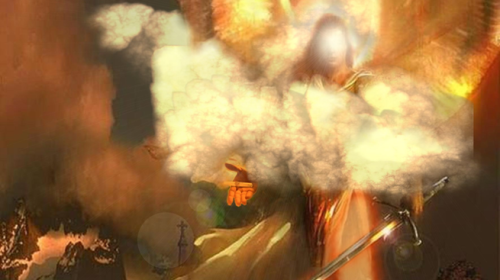
The Thief In The Night
Before or After Judgment?

In the New Testament the very first time we read of the thief in the night is in Christ’s Olivet Discourse. Yes, it is a warning to those caught unprepared and Jesus used the illustration as an example of how his coming will be “as were the days of Noah” in Matthew 24:36-44.
Those who hold a Rapture view will often use the phrase to describe Christ’s coming to take away his church where we “will be caught up together with them in the clouds to meet the Lord in the air” (1 Thessalonians 4:17). In the latter verse, “caught up” is the Greek word ‘harpazo’ from which the term “Rapture” is derived based upon the Latin word ‘rapiō’ which means to be “caught up” or “snatch up.”
The question in this case is whether the term “thief in the night” is a warning concerning in what way those unbelievers are caught unawares; at the Second Coming of Jesus Christ, or before a different sort of judgment unbelievers find themselves in, the “lead-up,” if you will, to the Second Coming. That lead-up being the judging of the nations known as the Tribulation. The Tribulation, described by Jeremiah as “the time of Jacob’s (Israel’s) trouble” as well as “the seventieth week of Daniel” and played out in long form throughout most of the Book of Revelation is described as “the time of His indignation” in various terms of wrath, that sees an ultimate culmination of wrath that peaks in Revelation 19 (and various Old Testament passages) with the Return of the King.
As with any proper interpretation, similar to good real estate, it is about Context, Context, Context. In Jesus’ first example of the flood, we read:
“But concerning that day and hour no one knows, not even the angels of heaven, nor the Son but the Father only. For as were the days of Noah, so will be the coming of the Son of Man.” (Matthew 24:36-37)
Therefore, we see the event described is not known with respect to either calendar or clock. It just arrives. Now this question; does the event happen before or after the flood? We all know the answer and Jesus clarifies in the following verses.
For as in those days before the flood they were eating and drinking, marrying and giving in marriage, until the day when Noah entered the ark, and they were unaware until the flood came and swept them all away, so will be the coming of the Son of Man. (Matthew 24:38-39)
Notice the context tells us quite clearly that folks were going about life as usual when the rain began and the flood came and swept them all away. Need it be pointed out that the ending of judgment was not what is in view in the passage?
Two distinct events, “meet the Lord in the air” as with 1 Thessalonians 4:17, or Second Coming where Christ returns all the way to earth as with Revelation 19 is in question. It ought to be clear (though for some it has not been for many, many years now) what the logical conclusion must be. But because the idiom “like a thief” is used with judgment in view, the knee-jerk reaction is to conclude it is about the Second Coming.
Here is the problem.
As noted earlier, because the Tribulation Week concludes with the trampling of the grapes of His wrath, does not mean the warning is not for the unbeliever at the beginning of judgment when it is too late. For as in the days of Noah, life went along as usual “and they were unaware until the flood came.” We can rest assured just a few minutes later as the waters began to rise and they found the door to Noah’s ark shut that they became aware that they had been caught as unaware as if they woke up only to find a thief had come in the night and robbed something precious.
There are two dominant parables to address immediately. One of which is the Parable of the Ten Virgins. So let’s ask ourselves a simple question. Were the five foolish virgins caught unprepared before the wedding, or after the door was shut and it was too late to enter the house? We should be aware by now that Jesus used the Hebrew Wedding Tradition several times in different ways to illustrate his coming, the bridegroom for his bride. It is worthwhile to note that ‘harpazo’ “the taking” is exactly as the Galilean Wedding Tradition played out. The father would give the word to his son that the room addition to his house is ready by telling him, “Go and take your bride.”
The bridegroom would then round up his party, starting with the best man, often at midnight for a bit of fun. They would grab things to bang on and at least one shofar and make a ruckus through the streets as the groom’s processional made its way through the streets. The best man would be shouting “behold the bridegroom!” It is interesting to note that the virgins would be attentive and alert at the bride’s house (the wise ones anyway) and they would go awaken the bride and her family while lighting their lamps.
The bridegroom would only come so far at the gates of the house, not all the way to her door. She would meet him there with her party where the two parties merge and return to the father’s house for a week-long celebration where the doors have been shut and no one comes in or out during that time. At the end of that time the door is opened and the bridegroom steps out with his veiled bride to publicly present her with the proclamation “Behold the wife!” whereupon she removes her veil. Then the public celebration of the Marriage Supper begins with the added guests.
So whether we are talking Noah’s flood, where flood was judgment and people died, it still meant deliverance for Noah. Or as with the foolish virgins who had no oil in their lamps in time to enter the wedding celebration, it still meant celebration for the bride and her bridegroom. Jesus catching the wicked by surprise who find themselves in the Tribulation Week, the church still finds themselves as the bride with the bridegroom in celebration for a week of years.
“Thief” also should remind us that in the Hebrew wedding tradition of “The Taking” that the bride of Christ is like another parable, The Pearl of Great Price in Matthew 13 where Jesus says beginning in verse 45, “Again, the kingdom of heaven is like a merchant in search of fine pearls, who, on finding one pearl of great value, went and sold all that he had and bought it.” The church is like that pearl Christ purchased with the value of his own life. We are that pearl he takes like a thief out of the world that hates him and his bride. They will look up and find no more salt and light, never realizing the great value of the pearl taken from their midst. Though, like the foolish virgins, some (particularly a remnant from Israel) will recognize it too late to enter the Father’s house.
Here is another question to consider. What kind of thief warns the household ahead of time what year, month and day of his arrival? Paul in 2 Thessalonians 2 gives the church a marker by which the appointed time can be counted off, but only after judgment has already commenced. We see the same thing in Revelation chapters 11 – 13 where the amount of time remaining can literally be calendared. We are told in terms of years (“a time, times and half a time”) months (42 of them) and days (1,260 of those) from some very specific events by which we can count to the Second Coming!
Added to that, unlike at the Rapture where for the world realization comes too late, at the Second Coming is too late for repentance. At the Second Coming Jesus Christ returns in very unthief-like fashion with thunder, lightning, a massive entourage, on horseback!
Logically, contextually, we cannot help but see that, as with those in Noah’s day, judgment catches the world off guard like a thief before the judgment. The after is no longer a surprise, just as with the Tribulation judgment upon the earth where the Second Coming no longer catches anyone unawares, “Like a thief in the night” might mean judgment for the lost, but for the saints it means deliverance.









